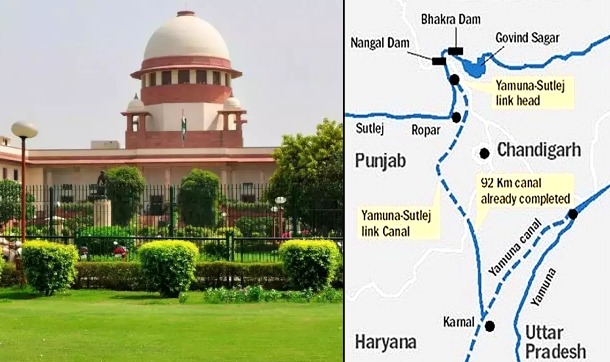
The Supreme Court directed the Union Government on Thursday to take a proactive part in the neighboring states of Punjab and Haryana’s efforts to identify feasible solutions to the Sutlej-Yamuna Link (SYL) canal issue.
A bench comprising of Justice Sanjay Kishan Kaul, Justice Ahsanuddin Amanullah, and Justice Aravind Kumar was considering an original suit filed by Haryana against Punjab in 1996, in which Haryana won a favorable verdict in 2002. Despite the top court repeatedly ordering Punjab to construct the SYL canal, the conflict between the two states continues to this date.
Earlier, the Haryana government notified the Supreme Court that bilateral negotiations with Punjab had failed to produce any substantial results, and requested it to consider issuing directives requiring the Punjab government to construct the remaining segment of the canal, as required by a 2002 judgment.
The proposed 211-kilometer-long canal connecting Sutlej and Yamuna was planned after the reorganisation of Punjab in 1966, but gained traction only after the centre issued a notification in 1976 stating that both states would receive 3.5 million acre-feet (MAF) of water each, and a 1981 water-sharing agreement was signed between them to reallocate the waters of Ravi and Beas.
While the Haryana government constructed 90 kilometers of the canal inside its borders, the construction in Punjab remained unfinished due to rising pressure from opposition parties and other organisations at the time.
Under directions, the counsel for the Haryana Government stated that there was no chance of obtaining a suitable settlement through bilateral negotiations. Senior Counsel Rakesh Dwivedi, standing on behalf of the Punjab Government, informed the Bench that the Union Government believes that additional talks are needed to resolve the matter.
Considering both the States have reached an impasse on the settlement talks, Justice Amanullah asked the Attorney General for India, R. Venkataramani, “In water conflicts between two states, the Union Government will serve as the final arbiter.” Why don’t you take a more active part rather than being a mute observer in the background?”
The Attorney General stated that in order for the Union Government to intervene as an arbitrator, a separate path must be taken; a formal river water dispute application must be filed. He further informed the Bench that, despite the Union Government’s efforts, the negotiations between the two states were deadlocked.
According to the Counsel for the Haryana Government, no settlement can be made until and until the Punjab Government displays a determination to depart from its stated stance. Noting this, the Bench said, “We emphasize once again that every settlement requires parties to deviate from their stated stance.”
Another point raised by Haryana was Punjab’s reliance on the Punjab Termination of Agreement Act, 2004, which states that it is still in effect. The Lawyer contended that the reliance is not legal. The Bench made it quite plain that after the presidential referral against Punjab has been addressed by the Supreme Court, no reliance on the Punjab Termination of Agreement Act can be put.
The Punjab legislature also approved the Termination of Agreement Act in 2004, which intended to annul the province’s water-sharing deal with Haryana.
Unfortunately, this Act was declared unconstitutional in 2016. When the dispute reached the Supreme Court on the strength of a presidential referral, Punjab’s request to be relieved from its commitment to complete construction of the river canal was flatly refused.
“The agreement could not have been unilaterally terminated by one of the parties by exercising its legislative power,” a Constitution Bench led by Justice Anil R. Dave declared, “and if any party or any state does so, such unilateral action of a particular state has to be declared contrary to the Constitution of India as well as the provisions of the Inter State Water Disputes Act, 1956.” A 2004 decree directing the federal government to take over the canal works from the obstinate state was also confirmed.




